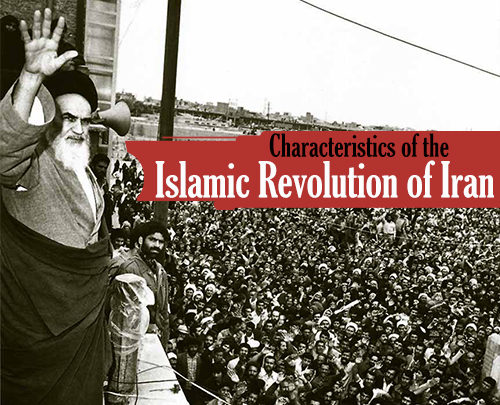Political aspects Of Imam Khomeini's overshadowed his other facets. As a
consequence, his scholarship in other fields of humanity is remained in
obscurity. It is time to deal with his thought in an academic manner and shed
the light on his works in order to grasp his thoughts and ideas. Imam Khomeini
was an authority in Figh, Islamic philosophy, mysticism, as well as poetry.
Thus, a through research on his works and thoughts are a worthy endeavor. Herein
the content of a speech delivered by Hamid algar, Professor at Berkeley Univ. in
New York on July 4th ,1994 are presented. With reference to certain verses from
the Holly Quran, Hamid Algar offers the view that Imam was among those who were
very firm against the unbelievers and merciful in dealing with the believers. In
this speech he pointed Imam's greater political Jihad and his prediction of the
disappearance of communism. He told that Imam exemplified all the dimensions of
Islam simultaneously. Indeed, the more we study Imam's thoughts and works, his
advises and declarations, the more we realize the great thinker and leader that
he was.
When we speak of the greatness of a human being there is always a danger.
Firstly, we know that greatness belongs to Allah alone. Second, if we call Imam
Khomeini "great" this simply inserts him into a long list of figures who have
exercised an important role in development of humanity. Speaking of the
greatness of Imam, I wish to avoid both of these danger of attributing greatness
to other than Allah and assuming Imam to be simply one more influential
personality among others in recent history. When searching for an Ayat from the
Holly Quran with which to open the presentation, entirely by chance I opened the
Quran at the following:
﴾O you who believe! If there are those among you who should turn away
from their religion then Allah will bring forth a people whom He loves and who
love Him, and they are humble to the believers and powerful and harsh towards
the unbelievers. They struggle on the path of Allah and they fear not the
censure of any censure. This is the super abundance of Allah that He grants to
whom He wills, and Allah is all encompassing, all knowing. (5:54)﴿
It seems to me that this Ayat is, indeed the most appropriate of all possible
Ayat of the Holly Quran with which to begin an evocation of the specific
greatness of Imam. It's true that the verse refers to the plural (people), but
Imam may be regarded as a supreme example of the category mentioned in our
present stage. It immediately struck me, upon seeing the Ayat, that we have here
an enumeration of many of the characteristics of the Imam. The first and
foremost one is that his whole being was permeated by love of Allah, a love
which enabled him to dispense with the illusions, the fears and the deficiencies
that halt many of us in this world.
The same love which is mentioned in the Ayat. Next, the Imam was indeed among
those who was gentle and humble towards the believers. The Imam, on one hand,
was a manifestation of the power of Allah, one who brought about, by Allah's
permission a tremendous transformation, which was none other than a
manifestation of the Divine Power. Yes, at the same time he was a man who, in
his behavior, in his comportment, was indeed humble before the believers and at
the same time he was among those who were firm, powerful and unafraid with
respect to the unbelievers. In fact, we may say that Imam also manifested the
quality expressed in the Ayat were Allah says:
﴾Muhammad, the Messenger, and those who are with him are extremely firm
against the unbelievers, kind and merciful among themselves.(48:29)﴿
Imam was among those who were very firm against the unbelievers and merciful in
dealing with the believers. The first Ayat, we mentioned speaks of Jihad. The
word Jihad has had numerous misuses in the present age. The reality of Jihad, in
the present age, is extremely rare. Of course, a multifaceted reality, its
reality begins with an inner dimension. The inner Jihad, the Jihad Imam spoke of
in the celebrated lecture delivered in Najaf, was clearly exemplified by him in
his own person. Beyond that he declared jihad against the outward enemy and not
necessarily a Jihad that involves recourse to weapons; but a Jihad definitely on
occasion if necessary included that. Thus we find in the person of Imam one who
practiced Jihad in all its comprehensive forms. The description of these people
whom Allah shall bring forth continues:
﴾And the fear not the censure of any censurer.(5:54).﴿
This is another necessary corollary of that first attribute that Allah has
mentioned. "He loves them and they love Him", in other words there is a firm
primary relationship of love between Allah and those of His chosen servants that
are mentioned here. Once that a firm relationship of love is in existence, it
follows that the believer should not fear the censure of any censurer. Out of
fearlessness of any man comes a total disregard for reproaches of any kind from
the enemies of Allah.
This is, of course, another very clear and outstanding attribute of Imam
Khomeini. "And that is none other than the super abundance, the generosity of
Allah." This combination of unique attributes is none other than the generosity
of Allah, and it is, moreover, given by Him. He gives it, He bestows it, upon
whomever He wills. It's not something to be acquired by efforts, which brings me
to what I call, hesitantly and with reservations, the greatness of Imam. If we
speak of the greatness of Imam, it is precisely because we see manifested in him
qualities which were indeed the result of a divine gift. It is not a question of
exertion on his part, although without doubt he was one whose whole life was
devoted to conscientious effort and struggle. But in a certain sense we may say
that the greatness of Imam was precisely a reflection of the greatness of Allah
Himself. I hope this does not sound like an exaggerated form of expression to
you. Let me clarify what I mean by examining two further Ayah:
First, Allah says:
﴾To Allah belongs power and glory and to His Messenger and to the
believers. however, the hypocrites do not know.(63:8)﴿
And in another Ayat, also referring to the hypocrites, Allah says:
﴾Those who take the unbelievers as friends and protectors in
preference to the believers do they expect to find power and glory? (4:139)﴿
Certainly, power and glory is to be found with Allah exclusively. How do you
reconcile these two Ayats? The second one concludes by saying "Ezzat
(greatness)" belongs exclusively to Allah while the first says it belongs to
Allah and to his Messenger and to the believers. Clearly what is meant here is
that power and glory as a matter of principal and in essence do indeed belong to
Allah. However, insofar as the Messenger (peace be upon him and his household)
is the instrument of Allah, then in them too is a reflection of the Divine
Power. Taking this into account, I think when one speaks of the greatness of
Imam, it is the greatness of Allah reflected in him in a certain fashion. But it
is not his greatness it is the greatness of Allah manifested in the form of a
choice human being. It struck me often, when studying the history of the Ulama
of the Shi"a, how, in the twentieth century, titles have become extremely
common. For example the title Ayatollah and the title Hujjatul Islam. As these
titles became more common and easily applied, their value and meaning has not
necessarily tended to decline. But, if one think of the true underlying meanings
of these terms, I think we have a key to understanding what the role of Imam
was, what the true nature of his personality was, and how we should understand
his historical impact. Of course we refer to him as the Imam because he
transcended by far, what is implied conventionally in terms of Ayatollah or
still more Hujjatul Islam. Nonetheless, if one looks at the true sense of these
two terms, one may say that the Imam is among those few people to whom the
literal sense of those words applied. Ayatollah means a sign of Allah. It may be
said that, potentially all human beings are signs of Allah, in that Allah
manifested His attributes most comprehensively in man, but few human beings
actually and practically are in the state of being a sign of Allah. Allah
manifested His attributes in man in the mode of his functioning, his action as a
vicegerent on earth bearing the responsibility of free will, and knowledge of
right and wrong; all of these qualities make each man or woman a potential sign
of Allah. However, that state remains, for the majority, merely potential and
when one looks at such a people (including most of us), one sees a falling away
from perfection, a failure to realize this potential.
There are those individuals in whom the divinely accorded function of
vicegerency and instrument of Divine Will is realized, and it seems that Imam
was one of those persons. He was a sign of Allah, who was emptied and purified
of any individual volition, who was motivated and determined by the love of
Allah. By his desire to serve Allah, by his wish to submerge himself in
obedience to Allah, he achieved this high state.
* Source: Message of
Thaqalayn, Vol. 1, No.4 p.49-57, October 1994
Published by: Ah al-beyt ("a)World Assembly, Tehran, Islamic Republic of Iran.
Website:www.ummah.net/khoei/khomeini.htm

















